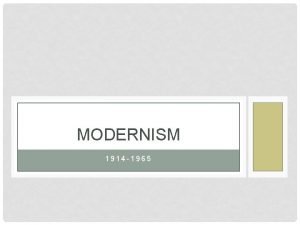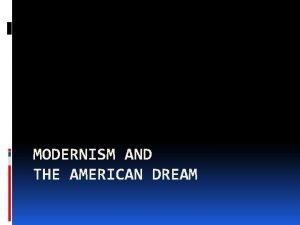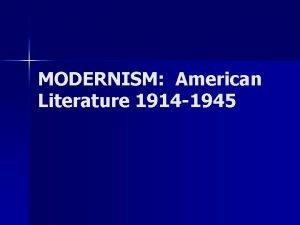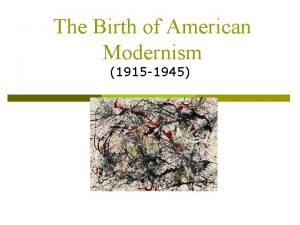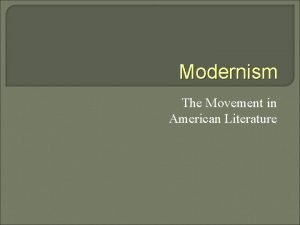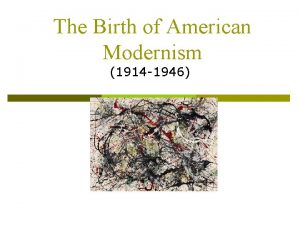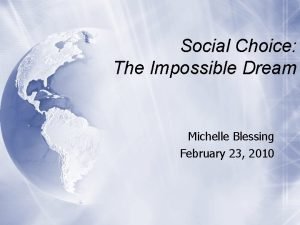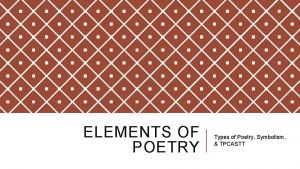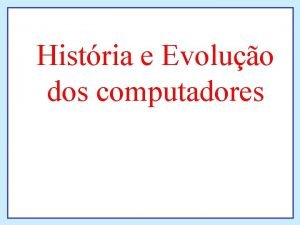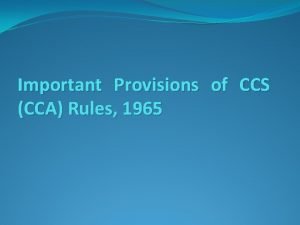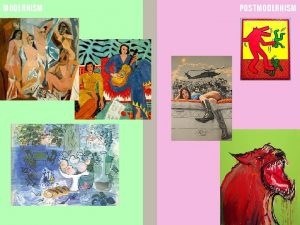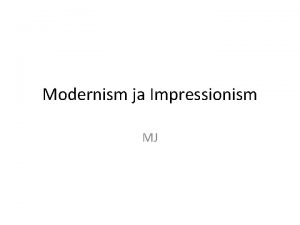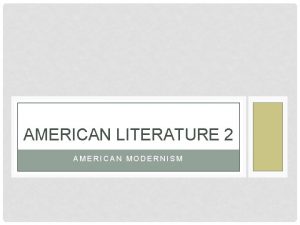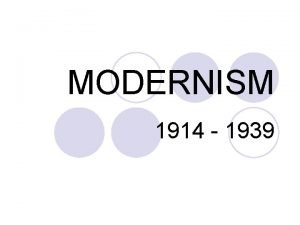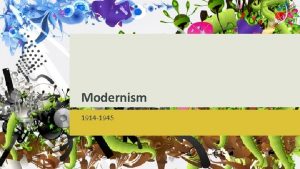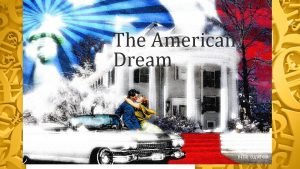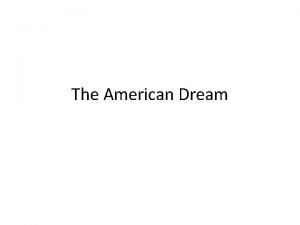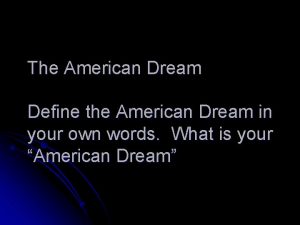MODERNISM 1914 1965 THE AMERICAN DREAM America is



















- Slides: 19

MODERNISM 1914 -1965

THE AMERICAN DREAM • America is seen as a “promise land” or “New Eden” • Beautiful, bountiful, land of limitless possibilities • Optimistic views on progress prevail • Life is continually improving; opportunities are continually advancing • Faith in the individual • Anyone can triumph and succeed in this land with a bit of effort, perseverance, and common sense.

DEATH OF THE AMERICAN DREAM • Industrialism & Technology • Rapid transformation of everyday life in early 1900 s • Spread of electricity, proliferation of cinema and radio, expansion of cities • Airplanes, wireless communication, massproduced automobiles

DEATH OF THE AMERICAN DREAM • World War I • Unprecedented destruction • 7 million civilians die (massacres & military battles; starvation & exposure; influenza) • 11 million soldiers lose their life • Dominance of Science • Planck’s quantum theory & Einstein’s theory of relativity • “empirical explanations can be found for everything” • This notion weakens the influence of organized religion

THE RESULTS • All elements of modernity combine to undermine traditional values and ideas. • Skepticism, cynicism, and pessimism about life and nature prevail. • Disillusionment with morals, religion, country, progress, technology, etc. • Fragmentation: coherent worldviews blown apart.

THE RESULTS • Spiritual Bankruptcy: atheism and loss of faith in any traditional moral order • Alienation: a feeling of the loss of all things that give life meaning and order • Modernity represents relentless change, loss, and destabilization.

THE RESULTS • “Because of the rapid pace of social and technological change, because of the mass dislocation of populations by war, empire, and economic migration, because of the urban juxtaposition of vast cultural differences, modernity disrupts the old order, up-ends ethical and social codes, casts into doubt previously stable assumptions about self, community, the world, and the divine”

THE BRIGHT SIDE Because all bets are off and nothing traditional holds water anymore, the following potentially positive things results: • Freedom from old forms: morally, artistically, and socially • Experimentation becomes a hallmark of Modern art and literature: you can do WHATEVER YOU WANT! • Fewer restriction on human thought and behavior

THE BRIGHT SIDE • Wider acceptance of the non-traditional, such as the role of women and minorities • Artists are truly free: Stream of consciousness, stories with no plot, free verse poetry • Freedom like this can be either terrifying or incredibly liberating and inspiring

RESPONSE: THE ROARING 20 S • Drink to oblivion to distract yourself from the pain of existence. • Hedonistic behaviors prevail in a effort to enjoy the good in life and ignore the bad. • Try to fill spiritual void with economic success, social status, etc. Whoever dies with the most toys wins. • This is clearly not an option after the Depression!

RESPONSE: THE LOST GENERATION • Generally speaking, the Lost Generation refers to those who became reckless and meandering after experiencing the war, either first or second hand. • They were disillusioned and lost faith in traditional values like courage, patriotism, and masculinity. • Writer Gertrude Stein coined the phrase and Ernest Hemingway used it famously as an epigraph to his novel The Sun Also Rises.

RESPONSE: THE LOST GENERATION • In literature, the Lost Generation refers to a group of writers and artists who left the United States after the war and emigrated to Europe, where they experimented with new styles of writing that would more accurately reflect the modern world. • Gertrude Stein, Ernest Hemingway, and F. Scott Fitzgerald are among the most famous members of the Lost Generation.

ELEMENTS OF MODERN LITERATURE • Value placed on experimentation and individualism • Attempt to find meaning in the wake of chaos • Look inward and attempt to record consciousness • Belief that nothing is knowable; truth is relative and constantly in flux • Modern world is viewed as impersonal, alienating, and antagonistic

MODERN POETRY • Just like the writers of the Lost Generation, poets took this opportunity to experiment with form and create poetry that fit with modernity. • Most modern poets wrote with two guiding principles in mind: • Make it new • Life is different; poetry must reflect that change • Make it difficult • Simple poetry evades modernity • New questions about the reality of the objective world leads to more imaginative poetry

MODERN POETRY • The following literary terms are useful when attempting to interpret and analyze modern poetry: • Imagery: A concrete representation of a sense impression, a feeling, or an idea. Imagery refers to the pattern of related details in a work. In some works one image predominates either by recurring throughout the work or by appearing at a critical point in the plot. Often writers use multiple images throughout a work to suggest states of feeling and to convey implications of thought and action. Some modern poets, such as Ezra Pound and William Carlos Williams, write poems that lack discursive explanation entirely and include only images.

MODERN POETRY • Free Verse: Poetry without a regular pattern of meter or rhyme. The verse is "free" in not being bound by earlier poetic conventions requiring poems to adhere to an explicit and identifiable meter and rhyme scheme in a form such as the sonnet or ballad. Modern and contemporary poets of the twentieth and twenty-first centuries often employ free verse. • Open Form: A type of structure or form in poetry characterized by freedom from regularity and consistency in such elements as rhyme, line length, metrical pattern, and overall poetic structure.

MODERN POETRY • Syntax: The grammatical order of words in a sentence or line of verse or dialogue. The organization of words and phrases and clauses in sentences of prose, verse, and dialogue. In the following example, normal syntax (subject, verb, object order) is inverted: "Whose woods these are I think I know. ” • Enjambment: A run-on line of poetry in which logical and grammatical sense carries over from one line into the next. An enjambed line differs from an end-stopped line in which the grammatical and logical sense is completed within the line.

WILLIAM CARLOS WILLIAMS The Red Wheelbarrow This is Just to Say so much depends upon I have eaten the plums that were in the icebox a red wheel barrow glazed with rain water beside the white chickens. and which you were probably saving for breakfast Forgive me they were delicious so sweet and so cold

E. E. CUMMINGS pity this busy monster, manunkind, not. Progress is a comfortable disease: your victim (death and life safely beyond) plays with the bigness of his littleness -electrons deify one razorblade into a mountainrange; lenses extend unwish through curving wherewhen till unwish returns on its unself. A world of made is not a world of born-pity poor flesh and trees, poor stars and stones, but never this fine specimen of hypermagical ultraomnipotence. We doctors know A hopeless case if—listen: there’s a hell of a good universe next door; let’s go
 Modernism and the american dream
Modernism and the american dream Modernism and the american dream
Modernism and the american dream Modernism vs realism
Modernism vs realism Regionalism literary movement
Regionalism literary movement Naturalism vs modernism
Naturalism vs modernism American modernism characteristics
American modernism characteristics Modernist literary movement
Modernist literary movement American modernism definition
American modernism definition To dream the impossible dream poem
To dream the impossible dream poem Poem types
Poem types Water quality act of 1965
Water quality act of 1965 Nutella 1965
Nutella 1965 1965 march
1965 march Segunda geração transistor 1956 1965
Segunda geração transistor 1956 1965 Fal 1965
Fal 1965 Ccs cca rules 1965
Ccs cca rules 1965 16 oktober 1965
16 oktober 1965 Krankenpflegegesetz 1965
Krankenpflegegesetz 1965 Cory aquino 1986
Cory aquino 1986 Cadena epidemiologica del sarampion
Cadena epidemiologica del sarampion
